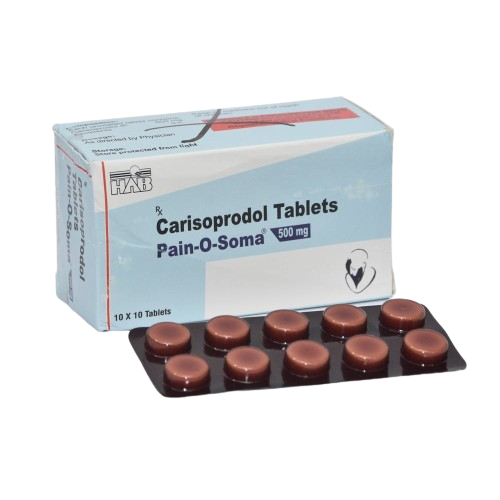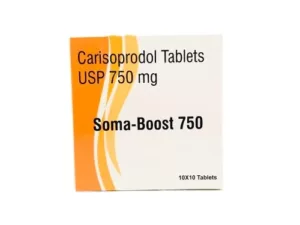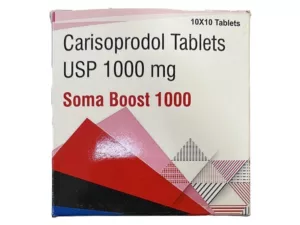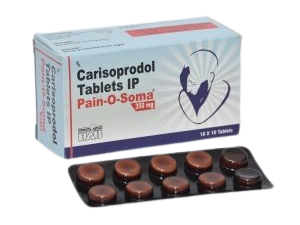“Carisoprodol 500 mg Tablet: Complete Guide to Uses, Dosage, Side Effects & Safety”
🔬 What is Carisoprodol 500 mg?
Carisoprodol 500 mg is a centrally acting muscle relaxant used to treat acute musculoskeletal pain and discomfort. It works by modifying communication between nerves in the brain and spinal cord, resulting in muscle relaxation and pain relief.
It is commonly prescribed for short-term use (generally 2–3 weeks), often in combination with rest and physical therapy.
⚙️ Mechanism of Action
Carisoprodol is metabolized in the liver into meprobamate, a compound that has sedative and anxiolytic effects. Its precise mechanism isn’t fully understood, but it is believed to depress interneuronal activity in the reticular formation and spinal cord, leading to muscle relaxation.
💊 Indications (Uses)
Carisoprodol 500 mg is indicated for:
- Relief of acute, painful musculoskeletal conditions
- Muscle spasms due to injury, overuse, or strain
- Adjunct to physical therapy and rest
- Occasionally used off-label for anxiety or insomnia (not recommended)
📏 Dosage and Administration
✅ Typical Adult Dosage:
- 500 mg taken 3 to 4 times daily, including at bedtime
- Duration: Use should be limited to 2 to 3 weeks
⚠️ Not intended for long-term use due to risk of dependence and lack of data on prolonged safety.
🕒 Onset and Duration:
- Onset: Within 30 minutes
- Duration of action: 4–6 hours
⚠️ Contraindications
- Hypersensitivity to Carisoprodol or meprobamate
- Acute intermittent porphyria
- History of drug or alcohol abuse
- Severe hepatic or renal impairment
⚠️ Warnings and Precautions
- May cause drowsiness, sedation, or dizziness
- Risk of dependence, abuse, and withdrawal symptoms
- Avoid in patients with a history of substance abuse
- Use caution in elderly patients or those with liver/kidney disease
- Not approved for use in children under 16 years
🧪 Drug Interactions
- Alcohol: Increases CNS depression
- Benzodiazepines, opioids, antihistamines: Additive sedative effects
- CYP2C19 inhibitors (e.g., fluvoxamine, omeprazole): May increase Carisoprodol levels
- Enzyme inducers (e.g., rifampin): May reduce effectiveness
🚨 Adverse Effects
Common:
- Drowsiness
- Dizziness
- Headache
- Nausea
- Blurred vision
Serious:
- Seizures (rare)
- Allergic reactions (rash, difficulty breathing)
- Drug dependence or withdrawal symptoms
- Liver or kidney dysfunction (rare)
🔄 Withdrawal Symptoms (if stopped abruptly after long use)
- Insomnia
- Vomiting
- Tremors
- Anxiety
- Hallucinations (rare)
💡 Taper the dose gradually if discontinuing after extended use.
🤰 Use in Pregnancy and Lactation
- Pregnancy Category C: Only use if the potential benefit justifies the risk
- Lactation: May pass into breast milk; not recommended
📦 Storage Instructions
- Store at 20–25°C (68–77°F)
- Keep away from heat, moisture, and light
- Store securely due to abuse potential
❗ Abuse and Dependence Warning
Carisoprodol has a known potential for physical and psychological dependence, particularly at higher doses or with long-term use. It is a Schedule IV controlled substance in many regions (like the United States).
🚫 Recreational or non-prescribed use is dangerous and illegal.








Ryder (verified owner) –
This medicine has helped me maintain balanced energy levels throughout the day. I feel more focused at work and less stressed. Plus, my digestion has improved significantly since I started taking it.
Mason (verified owner) –
Supports overall wellness and mental clarity
William (verified owner) –
I was dealing with hormonal imbalances, and after using this supplement for a few weeks, I felt a significant improvement. My mood swings have decreased, and I feel more in control of my body.
Mateo (verified owner) –
Feel more energized, focused, and less stressed